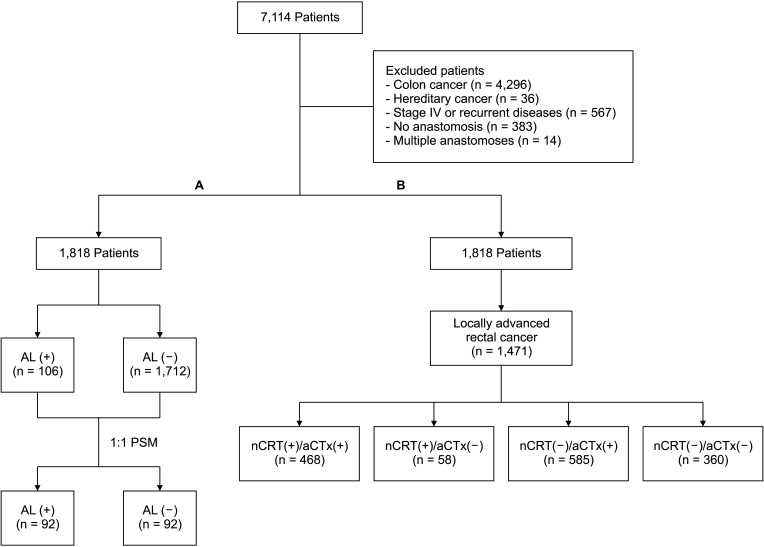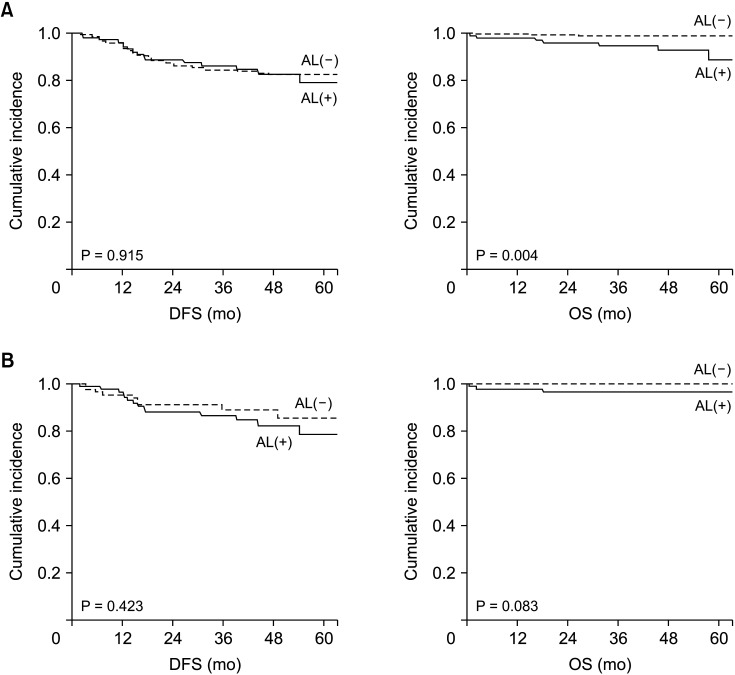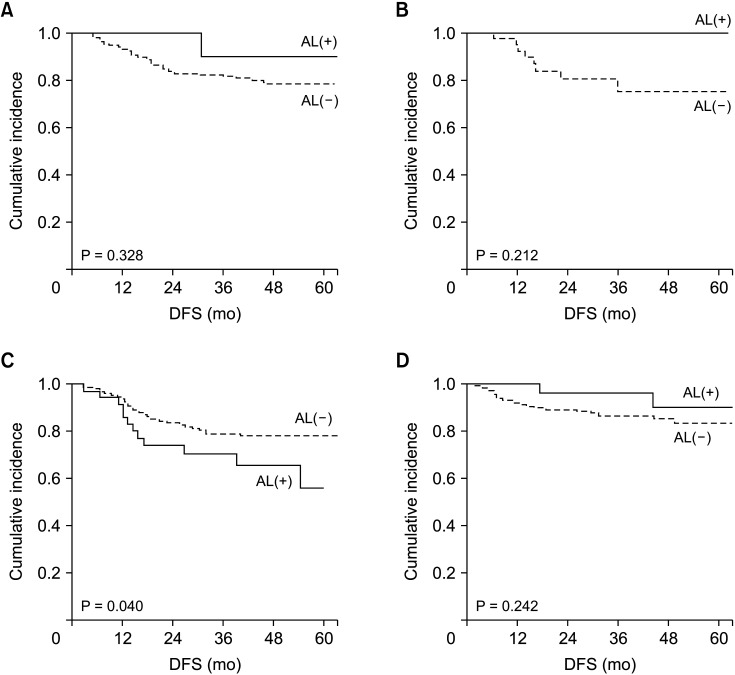Ann Surg Treat Res.
2022 Oct;103(4):235-243. 10.4174/astr.2022.103.4.235.
Neoadjuvant chemoradiotherapy determines the prognostic impact of anastomotic leakage in advanced rectal cancer
- Affiliations
-
- 1Department of Surgery, Hallym University Sacred Heart Hospital, Hallym University College of Medicine, Anyang, Korea
- 2Department of Surgery, Samsung Medical Center, Sungkyunkwan University School of Medicine, Seoul, Korea
- KMID: 2534128
- DOI: http://doi.org/10.4174/astr.2022.103.4.235
Abstract
- Purpose
The prognostic impact of anastomotic leakage (AL) in rectal cancer remains uncertain. We investigated the prognostic significance of AL in rectal cancer patients who underwent curative surgery, especially in terms of chemoradiotherapy.
Methods
A total of 1,818 rectal cancer patients who underwent radical surgery from 2011 to 2015 were retrospectively evaluated. We categorized patients according to AL and compared survival outcomes between the groups before and after matching. In locally advanced rectal cancer patients, we classified patients according to neoadjuvant chemoradiotherapy (nCRT) or adjuvant chemotherapy (aCTx) and analyzed survival outcomes according to AL in each group.
Results
Before matching, overall survival (OS) was significantly worse in the AL (+) group compared to the AL (–) group (P = 0.004). In matched patients, there were no differences in disease-free survival (DFS) and OS between groups (P = 0.423 and P = 0.083, respectively). In subgroup analysis for locally advanced rectal cancer, patients were classified as follows: nCRT (+) and aCTx (+) group; nCRT (+) and aCTx (–) group; nCRT (–) and aCTx (+) group; and nCRT (–) and aCTx (–) group. In the nCRT (–) and aCTx (+) group, patients with AL exhibited significantly worse DFS than patients without AL (P = 0.040). In the other 3 groups, there were no differences in DFS according to AL.
Conclusion
In locally advanced rectal cancer, AL had an adverse effect on oncologic outcome in patients receiving aCTx without nCRT but not in patients receiving nCRT.
Figure
Cited by 1 articles
-
Fluorescence-guided colorectal surgery: applications, clinical results, and protocols
Jin-Min Jung, In Ja Park, Eun Jung Park, Gyung Mo Son,
Ann Surg Treat Res. 2023;105(5):252-263. doi: 10.4174/astr.2023.105.5.252.
Reference
-
1. Sciuto A, Merola G, De Palma GD, Sodo M, Pirozzi F, Bracale UM, et al. Predictive factors for anastomotic leakage after laparoscopic colorectal surgery. World J Gastroenterol. 2018; 24:2247–2260. PMID: 29881234.
Article2. Keshvari A, Badripour A, Keramati MR, Kazemeini A, Behboudi B, Fazeli MS, et al. Introduction of a handmade vacuum-assisted sponge drain for the treatment of anastomotic leakage after low anterior rectal resection. Ann Coloproctol. 2022; 38:230–234. PMID: 34111349.
Article3. Clark DA, Yeoh E, Edmundson A, Harris C, Stevenson A, Steffens D, et al. A development study of drain fluid gastrografin as a biomarker of anastomotic leak. Ann Coloproctol. 2022; 38:124–132. PMID: 33445840.
Article4. Kinugasa T, Nagasu S, Murotani K, Mizobe T, Ochi T, Isobe T, et al. Analysis of risk factors for anastomotic leakage after lower rectal cancer resection, including drain type: a retrospective single-center study. BMC Gastroenterol. 2020; 20:315. PMID: 32977772.
Article5. Lu ZR, Rajendran N, Lynch AC, Heriot AG, Warrier SK. Anastomotic leaks after restorative resections for rectal cancer compromise cancer outcomes and survival. Dis Colon Rectum. 2016; 59:236–244. PMID: 26855399.
Article6. Mirnezami A, Mirnezami R, Chandrakumaran K, Sasapu K, Sagar P, Finan P. Increased local recurrence and reduced survival from colorectal cancer following anastomotic leak: systematic review and meta-analysis. Ann Surg. 2011; 253:890–899. PMID: 21394013.
Article7. Eberhardt JM, Kiran RP, Lavery IC. The impact of anastomotic leak and intra-abdominal abscess on cancer-related outcomes after resection for colorectal cancer: a case control study. Dis Colon Rectum. 2009; 52:380–386. PMID: 19333035.
Article8. Wang S, Liu J, Wang S, Zhao H, Ge S, Wang W. Adverse effects of anastomotic leakage on local recurrence and survival after curative anterior resection for rectal cancer: a systematic review and meta-analysis. World J Surg. 2017; 41:277–284. PMID: 27743072.
Article9. Oh BY, Park YA, Huh JW, Cho YB, Yun SH, Lee WY, et al. Metformin enhances the response to radiotherapy in diabetic patients with rectal cancer. J Cancer Res Clin Oncol. 2016; 142:1377–1385. PMID: 27011019.
Article10. Noh GT, Ann YS, Cheong C, Han J, Cho MS, Hur H, et al. Impact of anastomotic leakage on long-term oncologic outcome and its related factors in rectal cancer. Medicine (Baltimore). 2016; 95:e4367. PMID: 27472726.
Article11. Bell SW, Walker KG, Rickard MJ, Sinclair G, Dent OF, Chapuis PH, et al. Anastomotic leakage after curative anterior resection results in a higher prevalence of local recurrence. Br J Surg. 2003; 90:1261–1266. PMID: 14515297.
Article12. Ma L, Pang X, Ji G, Sun H, Fan Q, Ma C. The impact of anastomotic leakage on oncology after curative anterior resection for rectal cancer: a systematic review and meta-analysis. Medicine (Baltimore). 2020; 99:e22139. PMID: 32925766.13. Rahbari NN, Weitz J, Hohenberger W, Heald RJ, Moran B, Ulrich A, et al. Definition and grading of anastomotic leakage following anterior resection of the rectum: a proposal by the International Study Group of Rectal Cancer. Surgery. 2010; 147:339–351. PMID: 20004450.
Article14. Yun JA, Cho YB, Park YA, Huh JW, Yun SH, Kim HC, et al. Clinical manifestations and risk factors of anastomotic leakage after low anterior resection for rectal cancer. ANZ J Surg. 2017; 87:908–914. PMID: 25925005.
Article15. Furnée EJ, Aukema TS, Oosterling SJ, Borstlap WA, Bemelman WA, Tanis PJ, et al. Influence of conversion and anastomotic leakage on survival in rectal cancer surgery; retrospective cross-sectional study. J Gastrointest Surg. 2019; 23:2007–2018. PMID: 30187334.
Article16. Artus A, Tabchouri N, Iskander O, Michot N, Muller O, Giger-Pabst U, et al. Long term outcome of anastomotic leakage in patients undergoing low anterior resection for rectal cancer. BMC Cancer. 2020; 20:780. PMID: 32819329.
Article17. Amato A, Pescatori M, Butti A. Local recurrence following abdominoperineal excision and anterior resection for rectal carcinoma. Dis Colon Rectum. 1991; 34:317–322. PMID: 2007349.
Article18. Eriksen MT, Wibe A, Norstein J, Haffner J, Wiig JN. Norwegian Rectal Cancer Group. Anastomotic leakage following routine mesorectal excision for rectal cancer in a national cohort of patients. Colorectal Dis. 2005; 7:51–57. PMID: 15606585.
Article19. Smith JD, Paty PB, Guillem JG, Temple LK, Weiser MR, Nash GM. Anastomotic leak is not associated with oncologic outcome in patients undergoing low anterior resection for rectal cancer. Ann Surg. 2012; 256:1034–1038. PMID: 22584695.
Article20. An SH, Kim IY. Can pretreatment platelet-to-lymphocyte and neutrophil-to-lymphocyte ratios predict long-term oncologic outcomes after preoperative chemoradiation followed by surgery for locally advanced rectal cancer? Ann Coloproctol. 2022; 38:253–261. PMID: 35249276.
Article21. Feng Y, Luo J, Liu P, Liu L, Zhu Y, Cheng G, et al. Glasgow prognostic score and combined positive score for locally advanced rectal cancer. Ann Surg Treat Res. 2022; 102:153–158. PMID: 35317354.
Article22. Jang JH, Kim HC, Huh JW, Park YA, Cho YB, Yun SH, et al. Anastomotic leak does not impact oncologic outcomes after preoperative chemoradiotherapy and resection for rectal cancer. Ann Surg. 2019; 269:678–685. PMID: 29112004.
Article23. Roh MS, Colangelo LH, O’Connell MJ, Yothers G, Deutsch M, Allegra CJ, et al. Preoperative multimodality therapy improves disease-free survival in patients with carcinoma of the rectum: NSABP R-03. J Clin Oncol. 2009; 27:5124–5130. PMID: 19770376.
Article24. Fiorica F, Cartei F, Licata A, Enea M, Ursino S, Colosimo C, et al. Can chemotherapy concomitantly delivered with radiotherapy improve survival of patients with resectable rectal cancer?: a meta-analysis of literature data. Cancer Treat Rev. 2010; 36:539–549. PMID: 20334979.
Article25. Smith KD, Tan D, Das P, Chang GJ, Kattepogu K, Feig BW, et al. Clinical significance of acellular mucin in rectal adenocarcinoma patients with a pathologic complete response to preoperative chemoradiation. Ann Surg. 2010; 251:261–264. PMID: 19864936.
Article26. Kwilas AR, Donahue RN, Bernstein MB, Hodge JW. In the field: exploiting the untapped potential of immunogenic modulation by radiation in combination with immunotherapy for the treatment of cancer. Front Oncol. 2012; 2:104. PMID: 22973551.
Article
- Full Text Links
- Actions
-
Cited
- CITED
-
- Close
- Share
- Similar articles
-
- Prognostic Impact of Carcinoembryonic Antigen Levels in Rectal Cancer Patients Who Had Received Neoadjuvant Chemoradiotherapy
- Optimal anastomotic technique in rectal surgery to prevent anastomotic leakage
- Clinical Implication of Lateral Pelvic Lymph Node Metastasis in Rectal Cancer Treated with Neoadjuvant Chemoradiotherapy
- Clinical influence of neoadjuvant chemoradiotherapy on immunonutritional status in locally advanced rectal cancer
- Risk Factors for Anastomotic Leakage after Laparoscopic Rectal Resection in Rectal Cancer: Does Laparoscopic Rectal Resection Increase Anastomotic Leakage Rate?




